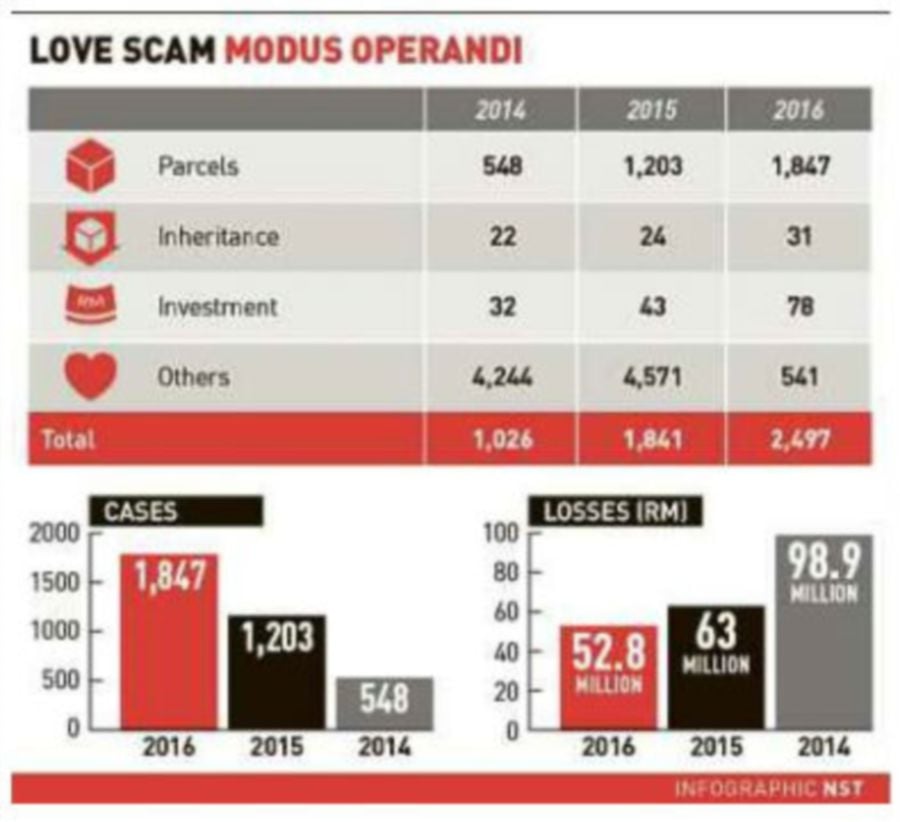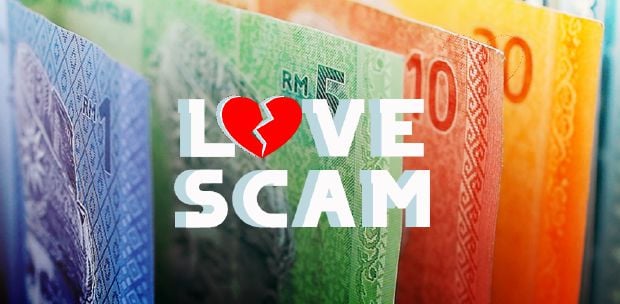Police say that advances in technology have resulted in a growing number of love scam cases. A total of 2,497 were recorded last year with losses amounting to nearly RM100 million. Another surprising fact is that an increasing number of millennials and Gen Y professionals are falling victim to the sweet words of these fake cyberlovers.
AS you are reading this, someone you know is probably being lured into an intricate trap of love scams, which recorded a whopping RM98.9 million loss last year.
In a day, an average of seven people fall prey to love scams in the country, resulting in a total of 2,497 cases last year.
Statistics from police revealed that the number of cases had increased significantly over the years, from 1,026 cases in 2014 (amounting to a RM52.8 million loss) to 1,841 cases in 2015 (a RM63 million loss).
As of last month, there have been 1,054 cases reported, with losses of almost RM43 million.
Federal police Commercial Crimes Investigation Department (CCID) deputy director (cybercrime and multimedia investigation) Senior Assistant Commissioner Datuk Mohd Kama-rudin Md Din said 85 per cent of cases were traced to Facebook.
“Scammers usually trap people with Facebook profiles that show them as being single, divorced or widowed, who don’t really go out much. Most importantly, they aim for those looking for romance in their lives.”
He said victims of love scams were duped into parting with their money through four shady activities, namely parcel delivery, inheritance money, investment money and others, such as black money.

There were 1,847 cases involving parcel delivery last year, followed by inheritance (31), investment (78) and others (541).
“If someone who looks like Richard Gere wants to win your affection, beware. Sure, it is very tempting, but also too good to be true.
Kamarudin said scammers would choose their potential victims based on what they found out about them on Facebook and other social media platforms.
“These scammers are smarter than we think. Due to the advancement in technology, they are able to access your Facebook account, study your friends, conversations and interests, and use them to their benefit.
“If you like diving, they will claim to be diving experts. If you are spiritual, they will send spiritual messages on religious events to show their care and concern. They mirror your every move and wait until you give in, slowly but surely, because they are patient.”
Kamarudin said another worrying trend was the prevalence of millennials and Gen Y victims in such cases.
“In the past, the victims were mostly above the age of 40. However, we now have a growing percentage of victims comprising millennials and Gen Y,” he said.

According to police figures, 535 cases last year involved those aged between 21 and 30, compared with 365 in 2015 and 211 in 2014.
“Our figures showed that there were 45 cases of love scam last year involving youngsters aged between 15 and 20, compared with 26 in 2015 and 18 in 2014.”
He said scammers usually worked in a team of at least two people, who ran the operation 24 hours a day, seven days a week.
“Their aim is to portray that they are caring so that within a month, you are charmed and willing to do anything.
“After establishing a strong connection, the scammers will suddenly stop contacting the victims, making the victims worried.
“That is when they roll out their next plan of action by concocting a sob story of being ill, tangled in family problems and trouble.”
Kamarudin said scammers earned their victims’ trust and would solicit their nude pictures out of “love”.
“Scammers are smart in spinning their web of deceit.
“They could manipulate women to do what they want.
“Some are even willing to become drug mules.”
Kamarudin said many of the victims used their personal bank accounts and phone numbers to make transactions with the scammers, making it difficult to prove the veracity of such cases because the actions were carried out on the victim’s own free will.
“To make matters worse, the victims don’t report about these scams until one month later, maybe more.
“Somehow, they hope that their cyberromance would return.
“By then, the money is gone and the perpetrators have moved on to their next victim, under a different profile.”
Kamarudin urged the authorities to tighten the rules with regard to foreign student enrolment in local colleges and carry out regular checks on the validity of pop-up colleges.
“We are not denying that there are genuine foreign students out there, but our No. 1 role is to protect our citizens.
“There should be checks on the status of local colleges, whether they are accredited by the Higher Education Ministry. They should check whether these students attend classes they signed up for.”
Kamarudin said love scam victims also came from foreign countries.
“We’ve had many cases where the victims were foreigners who came here looking for the people who had lured them over.
“Investigations showed that the bank account numbers used in the transactions were owned by Malaysians who were the scammers’ associates.
“However, the money has long gone.”
MCA Public Services and Complaints Department head Datuk Seri Michael Chong said most of the victims who lodged reports at the bureau were single mothers.
“Most of them are lonely and vulnerable. Out of the 26 cases the bureau received last year, two victims were married.
“When I asked if they were angry with their husbands for infidelity, they said that was not the case.
“They claimed they were blindsided and overwhelmed by emotions triggered by Facebook or WhatsApp messages.”
Chong said many of the victims refused to lodge reports because they felt guilty and ashamed of their actions.
“They were forced to come forward only when ah long come knocking on their doors at home and workplace demanding payment.”
Chong said 75 per cent of the cases the bureau handled involved ah long.
“The remaining 25 per cent came forward with their husbands after realising that they had been cheated.”
Chong said there were also those who begged him to listen to their stories in the event that they die.

“I have to live with one suicide and two attempted suicides because of love scams.”
Women’s Aid Organisation (WAO) advocacy manager Yu Ren Chung urged those caught in the deceitful web of fake online lovers to seek help urgently.
“The first step is to get help. If you feel ashamed, you need to know that it is not your fault. If you know anybody who is affected by this, it is important to offer your support,” Yu said.
WAO provides free counselling, shelter and crisis support to women experiencing any form of abuse.
Call WAO Hotline at 03-7956 3488, or send an SMS or WhatsApp message to Tina at 018-988 8058.





